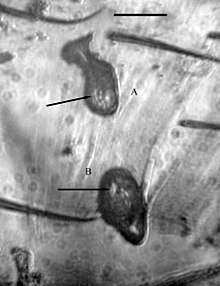Vetufebrus
| Vetufebrus | |
|---|---|
 | |
| Oocyts in Enischnomyia midgut | |
| Scientific classification | |
| Domain: | Eukaryota |
| (unranked): | SAR |
| (unranked): | Alveolata |
| Phylum: | Apicomplexa |
| Class: | Aconoidasida |
| Order: | Haemosporida |
| Family: | Plasmodiidae |
| Genus: | †Vetufebrus |
| Species: | †Vetufebrus ovatus Poinar, 2011 |
Vetufebrus is an extinct genus of haemospororida that was described from Dominican amber dating to the mid Tertiary era.[1]
The genus name is from the Latin words 'vetus' (old) and 'febris' (fever). The species name is derived from the Latin 'ovatus' (oval, egg shaped) and refers to the shape of the oocysts.
Although members of the Nycteribiidae transmit bat malaria presently, extant streblids have never been implemented as vectors of bat malaria. The description of this genus shows that these species have transmitted bat malaria in the past.
Description
This species was described from two oocysts attached to the midgut wall and from sporozoites in salivary glands and ducts of a fossil bat fly. The oocysts are ovoid and the sporozoites are short and stubby with rounded ends.
References
- ↑ Poinar, G.O. Jr (2011). "Vetufebrus ovatus n. gen., n. sp. (Haemospororida: Plasmodiidae) vectored by a streblid bat fly (Diptera: Streblidae) in Dominican amber". Parasites & Vectors. 4 (1): 229. doi:10.1186/1756-3305-4-229.